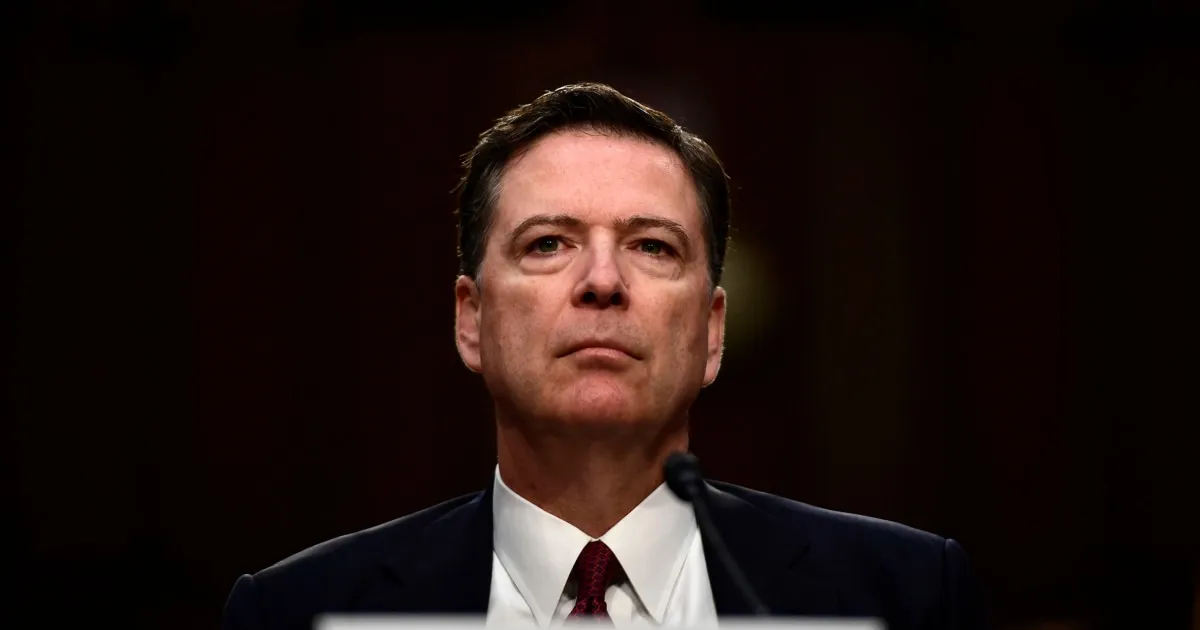
On Thursday, former FBI Director James Comey was indicted on serious charges just days after President Donald Trump publicly urged U.S. Attorney General Pam Bondi to prosecute him alongside two other political adversaries. The indictment outlines two key counts: making a false statement and obstruction of a congressional proceeding. In a statement shared on social media platform X, Bondi emphasized that this indictment mirrors the Department of Justice’s commitment to holding individuals who misuse their power accountable for misleading the American public, stating, “We will follow the facts in this case.” Notably, Comey’s name was not mentioned in Bondi's statement.
President Trump celebrated the indictment with a post on Truth Social, declaring, “JUSTICE IN AMERICA! One of the worst human beings this Country has ever been exposed to is James Comey.” Comey, however, did not provide any immediate comment regarding the indictment on Thursday night.
The legal troubles for Comey stem from his testimony during a Senate Judiciary Committee hearing on September 30, 2020. Specifically, he was questioned by Senator Ted Cruz about previous claims he made in 2017, where he asserted he did not authorize any leaks concerning the FBI’s investigations into Trump or former Secretary of State Hillary Clinton. Comey confidently stated, “I stand by the testimony.” Contradicting this, Comey’s former deputy, Andrew McCabe, has alleged that Comey did authorize him to leak information to the press, as outlined in a 2018 report from the Justice Department inspector general. However, the same report indicated that McCabe had made multiple false or misleading statements.
The statute of limitations for the charges was set to expire on Tuesday, adding urgency to the case. If convicted, Comey could face a maximum of five years in prison. This indictment raises concerns about the implications of Trump’s actions in reversing reforms that were put in place post-Watergate, preventing presidents from directing the Justice Department to pursue political adversaries. For decades, both Republican and Democratic presidents have respected the Justice Department's autonomy in making prosecutorial decisions.
Since commencing his second term, Trump has appointed various lawyers who previously served as his personal defense attorneys to significant positions within the DOJ, including Lindsey Halligan, the new acting U.S. attorney for the Eastern District of Virginia, who brought the charges against Comey despite internal reservations from her team regarding probable cause.
The indictment against Comey was issued by a grand jury in Alexandria, Virginia, and marked the last case referred to the court after several unrelated matters. During the proceedings, Judge Lindsey Vaala expressed confusion over the presence of multiple charging documents, prompting Halligan to make handwritten adjustments to one of them before they could be filed officially.
Less than a week prior to the indictment, Trump had publicly pressured Bondi in a September 20 social media post, urging her to take action against Comey and other critics, including Senator Adam Schiff and New York Attorney General Letitia James. Trump wrote, “We can’t delay any longer, it’s killing our reputation and credibility. They impeached me twice, and indicted me (5 times!), OVER NOTHING. JUSTICE MUST BE SERVED, NOW!!!” He reiterated this sentiment later that day, stating, “If they’re not guilty, that’s fine. If they are guilty, or if they should be judged, they should be judged. And we have to do it now.”
Comey has been a target for Trump since the FBI's investigation into Russian interference in the 2016 presidential election, which was initiated under Comey's leadership. Following Trump’s inauguration, tensions escalated between the two, culminating in Comey’s firing in May 2017, which led to the appointment of Robert Mueller as special counsel to continue the Russia probe. After his dismissal, Comey became a vocal critic of Trump, describing him as “unethical” and “untethered to truth” in his 2018 memoir, A Higher Loyalty: Truth, Lies and Leadership.
During Trump’s first term, the president tasked special counsel John Durham with investigating the origins of the Russia inquiry, but Durham's investigation did not result in any charges against Comey. Recently, Comey faced additional scrutiny from both the Department of Homeland Security and the Secret Service over a social media post that some officials interpreted as a call for violence against Trump.
In an MSNBC interview following that incident, Comey expressed concern over the politicization of power and the erosion of the rule of law, highlighting the broader implications of such actions in American politics.